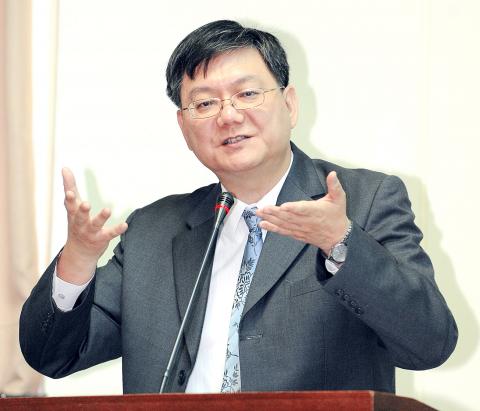Taiwan and Vietnam are negotiating a new bilateral investment agreement (BIA) aimed at protecting Vietnam-based Taiwanese companies, including those registered with the local government, but that do business worldwide, a government official said yesterday.
However, because it remains unclear when the negotiations can be concluded, only Taiwanese companies doing business in Vietnam can ask for compensation from the Vietnamese government under the existing BIA for losses resulting from recent anti-China riots, Vice Minister of Economic Affairs Woody Duh (杜紫軍) said.
“We hope the Vietnamese government can also recognize Taiwanese companies that registered as businesses in Vietnam, but trade internationally, so they can be protected under the Taiwan-Vietnam BIA,” Duh told the legislature’s Economics Committee.

Photo: Chen Chih-chu, Taipei Times
Earlier last week, violence broke out across Vietnam as local residents demonstrated against China’s deployment of an oil rig in waters claimed by the country. Taiwanese firms, such as Cheng Shin Rubber Industry Co (正新橡膠) and Formosa Plastics Group (台塑集團), also suffered from the attacks.
Chinese Nationalist Party (KMT) legislators Huang Chao-shun (黃昭順) and Lee Ching-hua (李慶華) demanded that the government act aggressively to protect Vietnam-based Taiwanese companies. They even suggested the Ministry of Economic Affairs persuade the attacked firms to move back to Taiwan.
In response, Duh said the current version of Taiwan-Vietnam BIA, which was signed in 1993, ensures governments compensate foreign companies through tax exemptions, low interest rate loans and delayed mortgage payments.
The two countries started talks about overhauling the BIA more than a year ago because the treaty was found to be flawed in comparison with BIAs of other countries that guarantee protection of offshore businesses, as well as government-to-government compensation, Duh said. While the ministry is revamping the BIA with its Vietnamese counterpart, Taiwanese businesses should collect evidence of attacks by Vietnamese protesters against their properties for future compensation applications, he added.
As of Sunday, 224 Taiwanese companies’ plants were reported to have been damaged during the riots, with 18 firebombed and five completely destroyed, according to ministry statistics.
About 1,100 Taiwanese companies have not yet resumed their operations due to security concerns, with most from the shoe, clothing, furniture, bicycle and electronics manufacturing industries, the ministry said.
Vice Minister of Economic Affairs Shen Jong-chin (沈榮津) is to lead a task force on a trip to Vietnam tomorrow.
Duh said the ministry will conclude assessing the losses to Taiwanese firms by Friday, when Shen is scheduled to meet Vietnamese government officials.

Right-wing political scientist Laura Fernandez on Sunday won Costa Rica’s presidential election by a landslide, after promising to crack down on rising violence linked to the cocaine trade. Fernandez’s nearest rival, economist Alvaro Ramos, conceded defeat as results showed the ruling party far exceeding the threshold of 40 percent needed to avoid a runoff. With 94 percent of polling stations counted, the political heir of outgoing Costa Rican President Rodrigo Chaves had captured 48.3 percent of the vote compared with Ramos’ 33.4 percent, the Supreme Electoral Tribunal said. As soon as the first results were announced, members of Fernandez’s Sovereign People’s Party

EMERGING FIELDS: The Chinese president said that the two countries would explore cooperation in green technology, the digital economy and artificial intelligence Chinese President Xi Jinping (習近平) yesterday called for an “equal and orderly multipolar world” in the face of “unilateral bullying,” in an apparent jab at the US. Xi was speaking during talks in Beijing with Uruguayan President Yamandu Orsi, the first South American leader to visit China since US special forces captured then-Venezuelan president Nicolas Maduro last month — an operation that Beijing condemned as a violation of sovereignty. Orsi follows a slew of leaders to have visited China seeking to boost ties with the world’s second-largest economy to hedge against US President Donald Trump’s increasingly unpredictable administration. “The international situation is fraught

MORE RESPONSIBILITY: Draftees would be expected to fight alongside professional soldiers, likely requiring the transformation of some training brigades into combat units The armed forces are to start incorporating new conscripts into combined arms brigades this year to enhance combat readiness, the Executive Yuan’s latest policy report said. The new policy would affect Taiwanese men entering the military for their compulsory service, which was extended to one year under reforms by then-president Tsai Ing-wen (蔡英文) in 2022. The conscripts would be trained to operate machine guns, uncrewed aerial vehicles, anti-tank guided missile launchers and Stinger air defense systems, the report said, adding that the basic training would be lengthened to eight weeks. After basic training, conscripts would be sorted into infantry battalions that would take

GROWING AMBITIONS: The scale and tempo of the operations show that the Strait has become the core theater for China to expand its security interests, the report said Chinese military aircraft incursions around Taiwan have surged nearly 15-fold over the past five years, according to a report released yesterday by the Democratic Progressive Party’s (DPP) Department of China Affairs. Sorties in the Taiwan Strait were previously irregular, totaling 380 in 2020, but have since evolved into routine operations, the report showed. “This demonstrates that the Taiwan Strait has become both the starting point and testing ground for Beijing’s expansionist ambitions,” it said. Driven by military expansionism, China is systematically pursuing actions aimed at altering the regional “status quo,” the department said, adding that Taiwan represents the most critical link in China’s